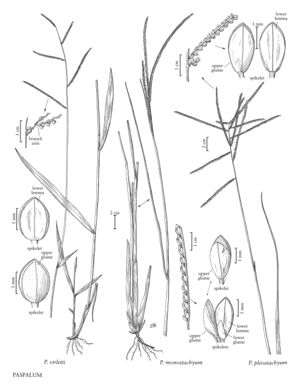Difference between revisions of "Paspalum pleostachyum"
FNA>Volume Importer |
imported>Volume Importer |
||
| (3 intermediate revisions by 2 users not shown) | |||
| Line 39: | Line 39: | ||
|publication year= | |publication year= | ||
|special status= | |special status= | ||
| − | |source xml=https:// | + | |source xml=https://bitbucket.org/aafc-mbb/fna-data-curation/src/200273ad09963decb8fc72550212de541d86569d/coarse_grained_fna_xml/V25/V25_1488.xml |
|subfamily=Poaceae subfam. Panicoideae | |subfamily=Poaceae subfam. Panicoideae | ||
|tribe=Poaceae tribe Paniceae | |tribe=Poaceae tribe Paniceae | ||
Latest revision as of 17:57, 11 May 2021
Plants perennial; cespitose. Culms 80-110 cm, erect; nodes glabrous. Sheaths glabrous, sparsely pubescent apically; ligules 1-2.9 mm; blades to 62 cm long, 3-7 mm wide, mostly involute, pubescent above, glabrous below. Panicles terminal, with 3-15 racemosely arranged branches; branches 5.2-12.5 cm, divergent to spreading, terminating in a spikelet; branch axes 0.3-0.8 mm wide, very narrowly winged, scabrous. Spikelets 2.2-2.5 mm long, 1-1.3 mm wide, paired, appressed to the branch axes, elliptic to obovate, white to light stramineous. Lower glumes absent; upper glumes glabrous, 5-veined; lower lemmas glabrous, 3-veined; upper florets 1.4-2 mm, white to stramineous. Caryopses 1-1.6 mm, suborbicular, brown. 2n = unknown.
Distribution
Puerto Rico, Fla.
Discussion
Paspalum pleostachyum grows in sandy soil or rocky areas in Florida, the West Indies, and from northern South America to Brazil. It is usually found along the coast.
Selected References
None.
